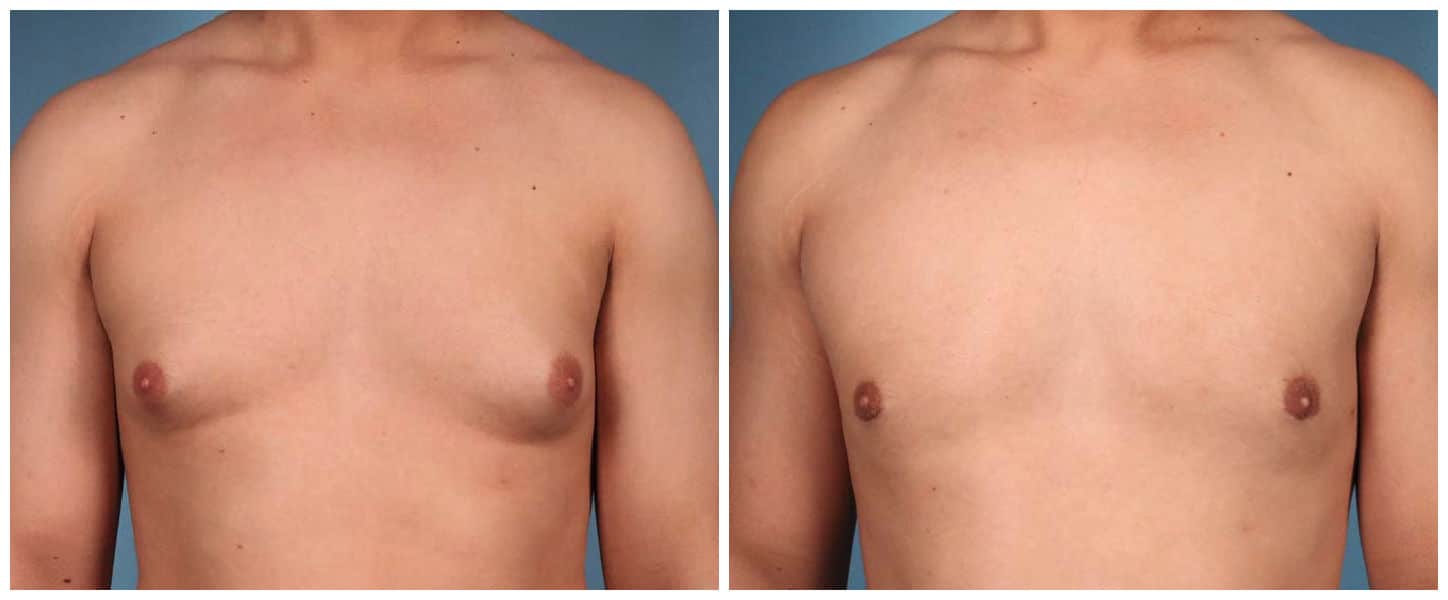Gynecomastia causes range from taking certain drugs and medications to undergoing certain medical treatments or having specific health conditions. Sometimes, it’s a natural cause or unavoidable. Other times, it’s something you’re doing to your body that you should consider stopping.
The key is to know what causes gynecomastia in you — not anyone else. But for some men, this may take a bit of digging. To help orient yourself to the most common causes of gynecomastia in males, we’ve created the following list. As always, speak to your primary care physician and a board certified plastic surgeon for further information that is relevant to you specifically.
The 6 Most Common Causes of Gynecomastia
1. Natural Hormonal Shifts
Hormones are the drivers of how our bodies change. From the time you are a baby to the end of life, hormones dictate most everything. When they make big shifts and changes, however, sometimes, undesirable side effects can occur.
This is most noticeable in regards to gynecomastia during puberty and older age. Both aging and the shift into adulthood can actually bring on breast tissue growth due to the changes. This is why young men going through puberty will often develop gynecomastia — often called pubertal gynecomastia.
Even newborn baby boys have “breast buds”. And later in life, some mature men may also develop excess male breast tissue.
2. Hormonal Imbalances
Unnatural shifts in hormones such as hyperthyroidism, hypogonadism, and other conditions can also unfortunately lead to gynecomastia. When the hormones estrogen and testosterone as well as luteinizing hormone become off, the result may be swollen breast tissue and the development of excess glandular breast tissue.
Likewise, tumors that affect your hormone levels may be at the root of gynecomastia. Tumors on the pituitary gland or adrenal glands and testicular tumors, for example, have sometimes been linked to the male breast disease. If you have a testicular tumor or another type of tumor, be sure to speak with your doctor about your options concerning treatment as in some cases, the treatment can exacerbate gynecomastia as well .
3. Medications and Treatments
Next, male breast tissue may become a problem when certain medications and medical treatments are taken and used. These include, but are not limited to, the following:
- Anabolic steroids and androgens
- Anti-androgens
- Certain antibiotics
- Tricyclic antidepressants
- Anti-anxiety medications
- Ulcer medications
- Chemotherapy
- Prophylactic breast radiotherapy
In some cases, you may want to speak to your doctor or specialist about ceasing or changing these medications, especially if your gynecomastia has gotten very bad. However, it should also go without saying that sometimes, dealing with the side effect of gynecomastia in order to continue on with a life-saving medical treatment is worth it.
4. Health Conditions
In addition to some hormone changes causing gynecomastia, other seemingly unrelated medical conditions can also lead to gynecomastia. These conditions include alcohol related liver disease (cirrhosis), kidney failure, prostate cancer, Klinefelter syndrome, and more.
If you’ve had idiopathic gynecomastia diagnosed, it may be worth getting a physical exam and looking into your overall health. No one wants to be diagnosed with a serious medical illness, but it’s also better to catch something big before it gets bigger. Often times, there is a surgical treatment, medication, or other therapy that can help.
5. Substance Use and Herbal Products
Illicit drugs and certain recreational drugs and herbal products are also speculated to be linked to the development of breast growth in men. These products include alcohol, marijuana, heroin, methadone, and certain herbal products such as lavender oil and tea tree oil. Some of these claims are not totally substantiated by science, however, and further research may be needed.
6. Obesity
Lastly, some men who have excess glandular tissue are simply overweight or obese. This issue can of course be linked to all sorts of additional complications. But the truth is some men simply tend to carry excess fat on their chests. This can later lead to excess skin in the same area.
In addition, the increased fat tissue overall can also lead to higher estrogen levels, which can further complicate the problem.
How Can Gynecomastia Be Treated?
It’s important, if possible, to know what’s causing your gynecomastia in the first place. This is always ideal because then, if possible, the root cause can be treated. If it’s drug use, for example, the drugs will ideally be stopped. If it’s a medication, sometimes the medication can be changed or the dose lowered.
In the event that a medical condition is causing gynecomastia, this diagnosis can also be a good thing as the treatment of the condition may lead to a cessation of breast tissue growth and sometimes even a reversal of the effects. Of course, this doesn’t always happen.
Once the root cause is determined (and often even if no cause has been found), the ideal treatment for gynecomastia is gynecomastia surgery. This is a plastic surgery procedure wherein the surgeon excises the excess fat, glandular tissue, and/or skin using very small incisions and often liposuction. The treatment is popular, well-established, and highly popular.
FAQ: Gynecomastia Causes
Can marijuana cause gynecomastia?
Some experts do believe that marijuana causes gynecomastia, due largely to the fact that marijuana can increase estrogen levels, which can contribute to breast tissue enlargement in one or both breasts.
However, the verdict is still out with some claiming that gynecomastia has nothing to do with marijuana use, and anti-drug sentiment is to blame for even the suggestion of a connection.
Is male breast cancer linked with male breast enlargement or gynecomastia?
There has been no known documentation that male breast cancer is positively correlated with gynecomastia in men.
Can you get Gynecomastia Surgery Covered by Insurance?
While most insurance companies do not cover the procedure, some may cover a portion of the costs if the surgery is deemed medically necessary. Typically, the condition must be severe enough in terms of symptoms for coverage to apply. It’s definitely worth contacting your insurance provider.
Contact Us to Set Up Your Consultation
Interested in learning more about what could be causing your gynecomastia? Board certified plastic surgeon Dr. Ashley Steinberg performs gynecomastia surgery at her Houston practice.
Please call today to schedule your one-on-one consultation appointment with Dr. Steinberg. Let us help you understand your gynecomastia and get the treatment and results you desire.














